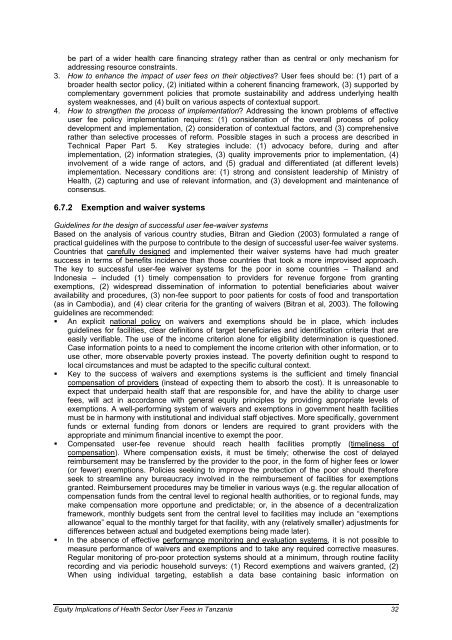equity implications of health sector user fees in tanzania
equity implications of health sector user fees in tanzania
equity implications of health sector user fees in tanzania
You also want an ePaper? Increase the reach of your titles
YUMPU automatically turns print PDFs into web optimized ePapers that Google loves.
e part <strong>of</strong> a wider <strong>health</strong> care f<strong>in</strong>anc<strong>in</strong>g strategy rather than as central or only mechanism for<br />
address<strong>in</strong>g resource constra<strong>in</strong>ts.<br />
3. How to enhance the impact <strong>of</strong> <strong>user</strong> <strong>fees</strong> on their objectives? User <strong>fees</strong> should be: (1) part <strong>of</strong> a<br />
broader <strong>health</strong> <strong>sector</strong> policy, (2) <strong>in</strong>itiated with<strong>in</strong> a coherent f<strong>in</strong>anc<strong>in</strong>g framework, (3) supported by<br />
complementary government policies that promote susta<strong>in</strong>ability and address underly<strong>in</strong>g <strong>health</strong><br />
system weaknesses, and (4) built on various aspects <strong>of</strong> contextual support.<br />
4. How to strengthen the process <strong>of</strong> implementation? Address<strong>in</strong>g the known problems <strong>of</strong> effective<br />
<strong>user</strong> fee policy implementation requires: (1) consideration <strong>of</strong> the overall process <strong>of</strong> policy<br />
development and implementation, (2) consideration <strong>of</strong> contextual factors, and (3) comprehensive<br />
rather than selective processes <strong>of</strong> reform. Possible stages <strong>in</strong> such a process are described <strong>in</strong><br />
Technical Paper Part 5. Key strategies <strong>in</strong>clude: (1) advocacy before, dur<strong>in</strong>g and after<br />
implementation, (2) <strong>in</strong>formation strategies, (3) quality improvements prior to implementation, (4)<br />
<strong>in</strong>volvement <strong>of</strong> a wide range <strong>of</strong> actors, and (5) gradual and differentiated (at different levels)<br />
implementation. Necessary conditions are: (1) strong and consistent leadership <strong>of</strong> M<strong>in</strong>istry <strong>of</strong><br />
Health, (2) captur<strong>in</strong>g and use <strong>of</strong> relevant <strong>in</strong>formation, and (3) development and ma<strong>in</strong>tenance <strong>of</strong><br />
consensus.<br />
6.7.2 Exemption and waiver systems<br />
Guidel<strong>in</strong>es for the design <strong>of</strong> successful <strong>user</strong> fee-waiver systems<br />
Based on the analysis <strong>of</strong> various country studies, Bitran and Giedion (2003) formulated a range <strong>of</strong><br />
practical guidel<strong>in</strong>es with the purpose to contribute to the design <strong>of</strong> successful <strong>user</strong>-fee waiver systems.<br />
Countries that carefully designed and implemented their waiver systems have had much greater<br />
success <strong>in</strong> terms <strong>of</strong> benefits <strong>in</strong>cidence than those countries that took a more improvised approach.<br />
The key to successful <strong>user</strong>-fee waiver systems for the poor <strong>in</strong> some countries – Thailand and<br />
Indonesia – <strong>in</strong>cluded (1) timely compensation to providers for revenue forgone from grant<strong>in</strong>g<br />
exemptions, (2) widespread dissem<strong>in</strong>ation <strong>of</strong> <strong>in</strong>formation to potential beneficiaries about waiver<br />
availability and procedures, (3) non-fee support to poor patients for costs <strong>of</strong> food and transportation<br />
(as <strong>in</strong> Cambodia), and (4) clear criteria for the grant<strong>in</strong>g <strong>of</strong> waivers (Bitran et al, 2003). The follow<strong>in</strong>g<br />
guidel<strong>in</strong>es are recommended:<br />
� An explicit national policy on waivers and exemptions should be <strong>in</strong> place, which <strong>in</strong>cludes<br />
guidel<strong>in</strong>es for facilities, clear def<strong>in</strong>itions <strong>of</strong> target beneficiaries and identification criteria that are<br />
easily verifiable. The use <strong>of</strong> the <strong>in</strong>come criterion alone for eligibility determ<strong>in</strong>ation is questioned.<br />
Case <strong>in</strong>formation po<strong>in</strong>ts to a need to complement the <strong>in</strong>come criterion with other <strong>in</strong>formation, or to<br />
use other, more observable poverty proxies <strong>in</strong>stead. The poverty def<strong>in</strong>ition ought to respond to<br />
local circumstances and must be adapted to the specific cultural context.<br />
� Key to the success <strong>of</strong> waivers and exemptions systems is the sufficient and timely f<strong>in</strong>ancial<br />
compensation <strong>of</strong> providers (<strong>in</strong>stead <strong>of</strong> expect<strong>in</strong>g them to absorb the cost). It is unreasonable to<br />
expect that underpaid <strong>health</strong> staff that are responsible for, and have the ability to charge <strong>user</strong><br />
<strong>fees</strong>, will act <strong>in</strong> accordance with general <strong>equity</strong> pr<strong>in</strong>ciples by provid<strong>in</strong>g appropriate levels <strong>of</strong><br />
exemptions. A well-perform<strong>in</strong>g system <strong>of</strong> waivers and exemptions <strong>in</strong> government <strong>health</strong> facilities<br />
must be <strong>in</strong> harmony with <strong>in</strong>stitutional and <strong>in</strong>dividual staff objectives. More specifically, government<br />
funds or external fund<strong>in</strong>g from donors or lenders are required to grant providers with the<br />
appropriate and m<strong>in</strong>imum f<strong>in</strong>ancial <strong>in</strong>centive to exempt the poor.<br />
� Compensated <strong>user</strong>-fee revenue should reach <strong>health</strong> facilities promptly (timel<strong>in</strong>ess <strong>of</strong><br />
compensation). Where compensation exists, it must be timely; otherwise the cost <strong>of</strong> delayed<br />
reimbursement may be transferred by the provider to the poor, <strong>in</strong> the form <strong>of</strong> higher <strong>fees</strong> or lower<br />
(or fewer) exemptions. Policies seek<strong>in</strong>g to improve the protection <strong>of</strong> the poor should therefore<br />
seek to streaml<strong>in</strong>e any bureaucracy <strong>in</strong>volved <strong>in</strong> the reimbursement <strong>of</strong> facilities for exemptions<br />
granted. Reimbursement procedures may be timelier <strong>in</strong> various ways (e.g. the regular allocation <strong>of</strong><br />
compensation funds from the central level to regional <strong>health</strong> authorities, or to regional funds, may<br />
make compensation more opportune and predictable; or, <strong>in</strong> the absence <strong>of</strong> a decentralization<br />
framework, monthly budgets sent from the central level to facilities may <strong>in</strong>clude an “exemptions<br />
allowance” equal to the monthly target for that facility, with any (relatively smaller) adjustments for<br />
differences between actual and budgeted exemptions be<strong>in</strong>g made later).<br />
� In the absence <strong>of</strong> effective performance monitor<strong>in</strong>g and evaluation systems, it is not possible to<br />
measure performance <strong>of</strong> waivers and exemptions and to take any required corrective measures.<br />
Regular monitor<strong>in</strong>g <strong>of</strong> pro-poor protection systems should at a m<strong>in</strong>imum, through rout<strong>in</strong>e facility<br />
record<strong>in</strong>g and via periodic household surveys: (1) Record exemptions and waivers granted, (2)<br />
When us<strong>in</strong>g <strong>in</strong>dividual target<strong>in</strong>g, establish a data base conta<strong>in</strong><strong>in</strong>g basic <strong>in</strong>formation on<br />
Equity Implications <strong>of</strong> Health Sector User Fees <strong>in</strong> Tanzania 32













